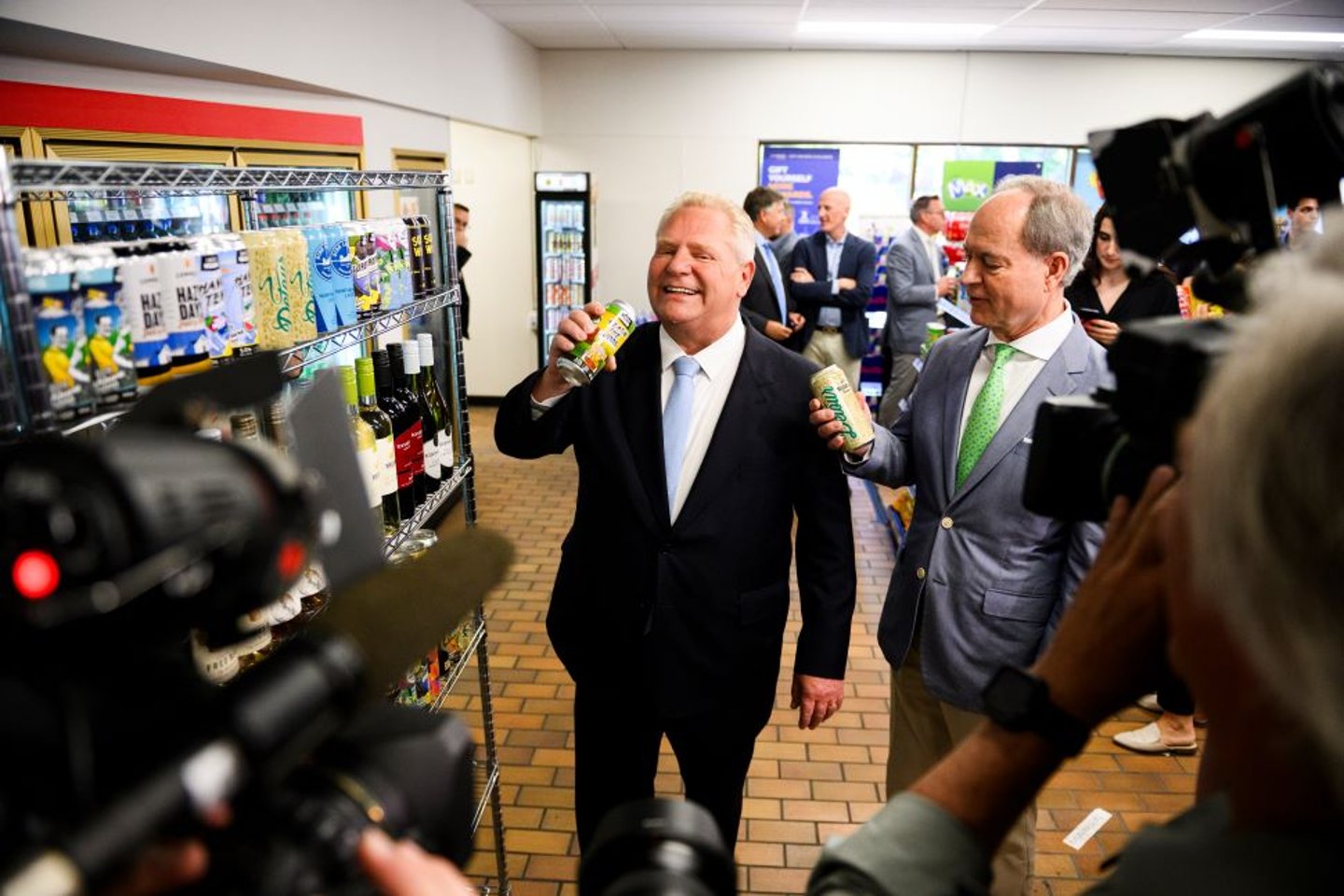Challenges ahead for early beverage alcohol sales in Ontario
It was always expected the Ontario government would move quickly to build on its earlier announcement that beverage alcohol would soon be available in more groceries and corner stores. It did not come as a surprise when Premier Doug Ford announced that his government was going to make that happen earlier than planned so that by the end of October of this year, every convenience, grocery, and big-box store in Ontario will be able to sell beer, cider, wine, and ready-to-drink alcoholic beverages if they choose to do so.
“We are delivering on our commitment to give consumers in Ontario the choice and convenience every other Canadian enjoys and we’re doing so even sooner than we had originally promised,” said Premier Ford at a press conference on Friday, May 24. “In the coming weeks and months, people in Ontario, like many Canadians across the country, will have the option to responsibly and conveniently purchase a case of beer or a bottle of wine on their way up to the cottage or to a summer barbecue, all while having even more opportunity to support local Ontario breweries and wineries.”
The government plans a phased approach to the accelerated timeline. Starting on August 1, the 450 grocery stores that are currently licensed to sell beer, cider or wine will also be able to sell ready-to-drink beverages and make available large-pack sizes like the 30-pack, a popular pack size found in Quebec. After September 5, all eligible convenience stores will be able to sell beer, cider, wine, and ready-to-drink alcoholic beverages, and after October 31, all eligible grocery and big-box stores will be able to sell beer, cider, wine, and ready-to-drink beverages, including in large pack sizes.
Ontario Craft Brewers (OCB) on their LinkedIn page applaud the news as they see the expansion of beverage alcohol sales in the province as beneficial to their industry and brewers.
"It is great news that craft brewers will be able to sell their fantastic products in more retail stores starting this year. We have been relentless in advocating for a new retail system that puts consumers first and makes it easier to find local beer and today's announcement is a big step in that direction,” says Scott Simmons, president, Ontario Craft Brewers. "We also applaud the government's commitment to complete its review of craft beer taxes by the end of 2024, and to eliminate the LCBO cost of service fees, as these two changes are critical to the success of the new system. These savings will help ensure that local craft breweries can invest, grow, and succeed in existing and expanded retail channels.”
Laurie Ure, one of the principals of Ure's Country Kitchen in Essex County south of Windsor Ont., says the announcement by Premier Ford, while not unexpected, does raise significant questions for an operation like hers. One being how much cooler space will she need to invest in to sell beer and the cost of new shelving for wine sales, as well as questions as to how much beer or wine they will be obligated to carry to sell it.
Ure says that with tobacco sales in the past, one was obligated to purchase minimum amounts. “You had to take 20 cartons a week and you had to carry every new product that came out, and if you were not going to order those 20 cartons per week, they were not going to deliver for you,” she continues. “Will it be the same with alcohol? Will we be required to make a minimum order from a supplier of beer and wine? Will it be only from a single supplier, or can we buy local, say from the different breweries in our area here?”
When the government announced its updated timeline, The Beer Store announced that it would continue as the primary distributor of beer in the province. “This announcement underscores our commitment to responsible beer distribution and environmental stewardship," said CEO Roy Benin in a statement. "With today's announcement, we look forward to the next stage in The Beer Store's evolution. The Beer Store will be transformed, where our role as primary distributor and recycling steward takes centre stage while maintaining a competitive retail footprint.”
READ: Brewing convenience: Crafting a new chapter for convenience stores
The Beer Store will also “expand our distribution fleet and network to service the new retail outlets, increasing our presence from approximately 1,500 private sector outlets to more than 10,000 during the term of this contract.” As part of that expansion, The Beer Store also announced an investment of $100 million dollars in future-focused projects, including a distribution centre in Bolton, Ontario, investments in online sales and delivery.
More concerning is going to be staffing. Ure says that she and her husband, Randy, hire many who are in high school and see working at the store and its ice cream shop and mini-golf operation as good first-time work. “We are very successful in hiring students here and we usually have them working here when they are 15 or 16 years old and many continue working for us for their entire high school lives,” she says. “Right now, we only have one of our 12 staff who is over 19 so we must ask ourselves if we are going to be selling beer and wine, will we need to hire staff who are 19 years and older. I’m a bit skeptical that we will be able to so.”
Anne Kothawala, president and CEO of the Convenience Industry Council of Canada (CICC) says that the announcement still leaves many questions unanswered about the introduction of beverage alcohol into convenience stores. Like Ure, she says questions about distribution remain to be worked out, especially for stores in rural areas of the province. As well, there are also questions about taxes, fees and levies that still need to be addressed so a level playing field is created for all participants, and for the sale of beverage alcohol to be profitable for retailers.
The CICC and the government are communicating right now to address those concerns.
“In these current economic conditions, there is only a certain premium that people are going to be willing to pay for the premium of convenience,” she says. “People are not necessarily prepared to pay a huge premium for it. Convenience store operators make decisions every day about which products they are going to sell, which products they can make a decent margin on, and which products are good traffic drivers.”
Another issue is getting convenience store operations up-to-speed on the steps they need to follow to be licenced to sell beverage alcohol. The government has outlined the rules and regulations retailers will have to follow and stated that the Alcohol and Gaming Commission of Ontario (AGCO) will oversee “the enforcement of the Liquor Licence and Control Act, 2019, and determines consequence for retailers who breach these rules, up to and including the loss of their licence to sell alcohol. If a retailer's licence is revoked or an application is denied, they cannot reapply for two years.”
The Ontario Convenience Store Association (OCSA) on its website says that it is working with the AGCO, LCBO, Ministry of Finance, as well as beer, wine and other alcohol providers “to ensure that independent retailers are prepared for selling alcohol in the near future," adding it "will soon provide more detailed information on the specific products you can sell, how to order them, and other essential details to ensure a smooth transition."
Convenience Store News Canada reached out to the AGCO to ask about the process convenience stores and other retailers will need to follow and the licencing process and was directed to the organization's website where it is stated that AGCO will begin accepting applications for retail licences from convenience stores and grocery stores on June 17, 2024. The AGCO will also be hosting a webinar (REGISTER HERE) on June 11 with the Liquor Control Board of Ontario (LCBO) for convenience and grocery store operators interested in selling beverage alcohol. The webinar will address eligibility requirements, the application process, and legal requirements to become a responsible private retailer of beverage alcohol.
“Licencing is just one piece,” Kothawala adds. “The other piece is training. Our industry prides itself on its track record of being responsible retailers and to uphold that we have a responsibility training program, ID Please, and in that we have a beverage alcohol unit, a separate module. So, when the AGCO launches it licencing process, we will be at the font of the line with training that is specific to the convenience industry, all about selling alcohol. This is going to be critical, getting your employees properly trained on this, to see alcoholic beverages responsibly.”
Several industry experts recently interviewed by the Toronto Star, raised concerns as to how many will be ready to go on the start date of September 5th, and what the price will be to consumers who step into their local convenience store to pick up a beer or wine.
While Donna Montminy, executive director of the Ontario Convenience Stores Association says her members are enthusiastic about the chance to sell beverage alcohol, retail consultant Bruce Winder suggests that with shelf and fridge space at a premium, prices may be higher than beer and wine sold at the LCBO, The Beer Store or a local grocery store that already carry beer and wine. He suggests that the premium for the convenience of stopping in a local convenience store could be up to 50%.
Others quoted in the Toronto Star article worry over how big of a selection of beer and wine will be available on that limited shelf and cooler space, even with the new rules asking that 20% of shelf space be set aside for beer and cider, and up to 40% for wine, for products made by local Ontario craft producers. One may discover only a limited selection of beer is on offer.
The hope by all is that competition and customers keep prices reasonable.








